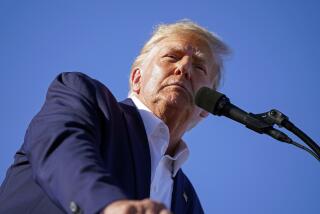Saddam Hussein Must Be Removed, Gerald Ford Tells Audience at UCI : Ex-Presidents: He appeared with France’s former head of state Valery Giscard-d’Estaing.
- Share via
IRVINE — Former President Gerald R. Ford on Wednesday called for the removal from power of Iraqi President Saddam Hussein when allied forces prevail over Iraq’s military forces.
“How that should be accomplished, I think, is premature to say,” Ford told a group of about 200 UC Irvine political science students. “But I think it is in the best interests of the Iraqi people. . . . My impression is that anything but him (Hussein) would be better.”
Ford, 77, added that Hussein and other Iraqi leaders should be tried as war criminals for their treatment of allied prisoners of war and for unleashing an oil spill in the Persian Gulf, both violations of the Geneva Convention, which has been signed by Iraq.
“Saddam Hussein and others responsible ought to be called before a world court to answer for these criminal acts,” Ford told the students, who peppered the address with warm applause.
Ford was at the Irvine campus Wednesday for a joint appearance with former French President Valery Giscard-d’Estaing to discuss the Gulf War and the changing face of Europe.
Both men emphasized that the war must be followed by efforts to find a permanent peace in the Middle East.
“It’s not sufficient to win the war,” said Giscard-d’Estaing, 64, now a deputy to the European Parliament.
Ford added that solutions must be found to Israel’s occupation of the West Bank and the Gaza Strip and to the issue of a Palestinian homeland. Before that can happen, Ford said, all factions of the Palestine Liberation Organization must renounce terrorism and recognize Israel.
“I am an optimist,” said Ford, who served as President from 1974 to 1977 after the resignation of Richard M. Nixon. “There is a different atmosphere now with the coalition of nations in the Middle East. In that atmosphere, I think we could expect some progress on these issues.”
On the subject of the emerging new European order, Giscard-d’Estaing, president of France from 1974 to 1981, told the students: “We are embarked on a very dramatic historical endeavor, which is the unification of the European continent.”
While great difficulties are yet to be navigated as the 12 nations in the European Community form a single a market and then move to create a single currency, Giscard-d’Estaing said he was confident that a single government would occur by the end of the century. “Then, Europe will have achieved what was envisioned at the end of the two world wars--political unity,” he said.
The two former presidents also spoke at an evening symposium sponsored by the Irvine Co., the UCI Alumni Assn. and the American Enterprise Institute. The event drew a crowd of more than 2,400 people, each of whom paid $16 to hear the men speak at UCI’s Bren Events Center. The focus of the evening round-table discussion was Europe’s new world position on the eve of the formation of a unified European economy.
At a news conference before the symposium, Ford and Giscard-d’Estaing told reporters that the outcome of the Gulf War, despite its heavy cost to the allied nations, will ultimately have a beneficial effect on the world economy and that of the new European community because the price of oil will then fall to its natural level of $18 to $22 a barrel.
On the subject of the economic embargo against Iraq, the former French president said he initially supported sanctions as the preferred means of forcing Iraq to withdraw from Kuwait. “But it was very clear that sanctions would have taken nine months to a year to work,” he added.
To wait so long would have risked the destruction of Kuwait and would have given Iraq more time to develop dangerous weapons, he suggested.
Both former presidents received $18,000 to appear at the symposium, according to university spokeswoman Karen Newell Young. She said the money was raised through private donations to support the symposium.
More to Read
Sign up for Essential California
The most important California stories and recommendations in your inbox every morning.
You may occasionally receive promotional content from the Los Angeles Times.












